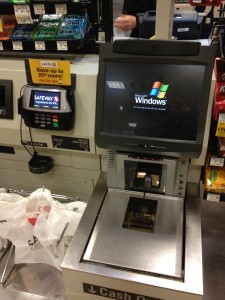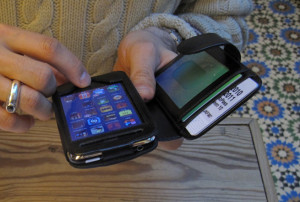Category: Mobile Point of Sale
September 30th, 2013 by Elma Jane
Future of Marketing Lies in Mobile Payments…Why?
Marketing and payments might seem like strange bedfellows to the average retailer, but in fact, they are converging rapidly to bring more value to consumers and merchants alike. Here are 10 reasons why the future of marketing is inextricably linked to payments innovation:
1. Cross-Platform Acceptance
Better yet, these targeted offers can be acquired and redeemed through different mediums…online, offline and mobile…and utilized interchangeably. This makes life easier on the consumer and thus makes them more likely to engage with new loyalty and rewards programs. Moreover, as the Internet and mobile solutions continue to merge, the digital “wallets” that many of us use online today (think PayPal) are, logically, moving to our phones. When these payment and marketing applications are accessible from the same device, customers can seamlessly receive pertinent offers and pay for goods at the same time in the same place. Other apps will give consumers the ability to shop in one medium and buy in another, simplifying omni-channel marketing to affect commerce across all channels. This kind of convenience and value is a win for both customer and merchant.
2. Loyalty and Rewards get Simpler
The reality is that it’s much easier to issue and redeem loyalty rewards, gift cards and discounts when they are integrated into the POS experience and don’t require customers or merchants to alter the existing in-store purchase or checkout stream. You can see these simplified applications already in practice at chains like Starbucks, as well as independent merchants that use systems like LevelUp.
3. Merchant adoption
The payment technologies that succeed will be the ones that are ultimately adopted by merchants, which in turn will lead to consumer usage. Key technologies that will likely facilitate widespread adoption of mobile payments…either proactively because merchants want to see what they can offer them, or passively as they upgrade devices…include:
EMV (chip and pin), which will force merchants to update their POS systems, likely catalyzing them to update all points of interaction.
NFC – Cloud Computing – Geofencing – QR Codes and even Basic Bar Codes
4. More Value for Consumers
And for consumers, the convergence of payments and marketing should deliver highly valuable deals, offers, comparisons information and more, ultimately providing drastic improvement of the buying and shopping experience.
5. More Value for Merchants
So what does this value look like? For merchants, the convergence of payments and marketing should bring in new customers, increase sales from existing customers, and provide more customer data. It should also create a more streamlined multi-channel experience so consumers have little barrier to adoption.
6. No Single Technology will Win
These new technologies introduce an interesting question: What should merchants do to prepare for this brave new world where payments and marketing collide? For one, merchants should avoid betting on any one technology. In fact, the POS needs to morph into something a little more complex, becoming instead a POI, where a broad variety of payment types, loyalty programs, coupons and more can be redeemed. Merchants should be in a position to choose what types of payment they want to accept and in what medium, and not be limited to fixed payment tenders.
When the convergence of marketing and payments will happen
The increasing adoption of mobile payments by merchants and consumers, when combined with new POS environments, will jump-start the convergence of marketing and payments. However, we’re still in the early stages.
Mobile commerce technologies are widespread but still working to gain traction from consumers en masse. Additionally, merchants haven’t yet felt the need to upgrade their POS systems to accept mobile payments
However, the October 2015 EMV Liability Shift, a date set by Visa and MasterCard for certain charge-back liabilities to fall to the merchant unless they have upgraded to EMV-capable POS systems, is likely to push merchants to upgrade their systems.
Once merchants begin to upgrade these POS systems, the smart ones will take the opportunity to add more features and functionality to the systems, including the ability to accept payment…and marketing-driven solutions from mobile handsets. That’s when we’ll see the value of two-way communication between merchants and consumers dramatically change the shopping experience and bring payments into the marketing mix.
7. Smartphone Adoption is Speeding Up
Consumers’ mobile phones are already equipped to deliver highly valuable offers, and adoption is increasing at a rapid pace. Smartphones bring with them new app technologies that include not only mobile payments but also loyalty and rewards programs that are designed to drive preference for stores, good and services.
8. Targeted Offers and Single-Use Applications
Of course, these solutions are still in their infancy. Elegant single-use applications, such as mobile wallets and gift cards, will soon grow to provide highly targeted offers that take into account everything from shopping preferences to location, providing incentives as a customer walks the aisle of a store. Just about every player in the payments ecosystem is thinking about these new commerce technologies. The winners will be those that demonstrate clear value for both the merchants and customers.
9. The “POS” is now a “POI”
A point-of-sale (POS) solution used to be a place where goods were purchased and money traded hands. Usually, this took the form of a cash register or credit card machine. Though these still exist, a wave of new value-added marketing services, such as targeted offers, discounts and highly valuable loyalty applications, have led to the transformation of the POS into a point-of-interaction (POI), a place where consumers and merchants meet to exchange value for value.
10. Two-way communication
When embedded in smartphones, new technologies…like near-field communication (NFC), QR codes, geofencing and cloud authentication solutions…allow for two-way communication between the consumer and the POS solution, enabling merchants to deliver coupons and offers directly to customers’ mobile phones through targeted integrated programs.
Posted in Digital Wallet Privacy, e-commerce & m-commerce, Mobile Payments, Mobile Point of Sale, Smartphone Tagged with: bar codes, cloud, device, EMV, handsets, innovation, loyalty, marketing, merchants, mobile, nfc, offline, omni-channel, online, payments, PayPal, phones, POI, point of interaction, POS, qr codes, rewards
September 26th, 2013 by Elma Jane
Mobile checkout integrated into transportation ticketing app by Barclay’s Pingit
Barclay’s Pingit mobile payments service is teaming up with Corethree to bring the financial institution’s mobile checkout to public transportation customers in Britain.
Corethree offers a mobile wallet for transport ticketing in Britain. By including Barclays Pingit in its wallet, Corethree can offer users more flexibility in how they pay for tickets.
“Providing a variety of native payment solutions within the application enhances the customer experience by allowing them the same type of purchasing experience that they currently enjoy from their favorite websites and ecommerce sites.”
“In the U.S. this includes integrating with payment option like PayPal and eventually electronic wallet providers as well.”
Mobile checkout
Pingit was introduced in early 2012, enabling users to make person-to-person payments.
The app’s breadth of services have been expanded several times since to include mobile payments from NFC tags and mobile checkout for Web sites and print ads.
Corethree reports that it is the first business to integrate Barclays Pingit mobile checkout, enabling bus passengers to browse, select, purchase and use bus tickets from their mobile devices.
Over the next 12 months, Corethree and Barclays will roll out their mobile payment services to other transport operators, with the goal of reaching up to 1 million passenger journeys per day.
The service will be available via Android and iPhone devices on any mobile network.
Mobile payments entry
Public transportation organizations around the world are embracing mobile ticketing to make it easy for riders to purchase and use tickets from their smartphones. Enabling users to purchase transit tickets anywhere at any time that can be used. Last year, the Massachusetts Bay Transportation Authority rolled out a new mobile ticketing service, giving commuters a way to purchase and display rail tickets on their smartphones.
“Transit is an integral part of consumers’ daily lives, and as such providing consumers with a secure way to pay with their phone and not have to carry cash or exact change is a great starting point for people to get comfortable using mobile payments.”
“Mobile ticketing is a great way to introduce customers to making payments from their mobile device.”
Posted in Credit card Processing, Digital Wallet Privacy, e-commerce & m-commerce, Electronic Payments, Mobile Payments, Mobile Point of Sale, Travel Agency Agents Tagged with: checkout, devices, electronic wallet, integrating, Iphone, mobile, nfc, payment, payments service, smartphone, Tags, ticket, ticketing, tickets, transportation, travel
September 20th, 2013 by Elma Jane
“Hardware”: Key to Mobile Commerce’s future
If you thought mobile commerce was about the cloud or software, proof to the contrary is mounting. In fact, four key moves by three big companies over the past week have provided more evidence that software and the cloud are taking a back seat to a significant force in mobile.
OTA VS. Device Access
Without security mobile commerce is dead in its tracks after the first major breach. Two basic elements: Access to mobile apps and over-the -air security. Both necessary but they play entirely different roles. Mobile apps have direct access to our lives. With them we can share our professional story, personal lives and of course move money around with mobile banking and mobile commerce apps. Therefore, ensuring that no one but YOU can access your apps is important. That is why you probably have myriad user names, passwords and PINs. This brings us to our first big hardware move.
Apple’s Touch ID
Apple introduces hardwarebased biometrics with its new Touch ID. Essentially the first commercially product available biometric button, combines the user request (pushing button) and the identity check (scanning the fingerprint) into one action.
Apple correctly presented this feature as an excellent for a personal identification number to activate the phone or complete an iTunes purchase.
Apple’s Secure Enclave
The “secure element” is essentially hardware and software that, when combined, function like a smartcard running on a part of the mobile phone that no other app can access. Apple announced that the highly sensitive fingerprint data from its Touch ID product would not be stored on a remote server, in the cloud or even in the iPhone memory. It will be stored in the “secure enclave” of its new A7 processor chip.
Difference between a secure enclave and a secure element? Probably little or nothing. We don’t know if Apple’s secure enclave uses smartcard technology, we know it is essentially hardware and software running on the part of it’s a& chip that no other app can access.
Posted in Electronic Payments, Mobile Payments, Mobile Point of Sale Tagged with: Apple, commerce, mobile, secure, Security
August 16th, 2013 by Admin
 Square credit card processing service was fined $507,000 by Florida’s Office of Finance Regulation for operating an electronic payment processing service without a money transmission license. Some may remember the same treatment in Illinois in March of this year. The order covers two years of operation and processing including Square Register, stored value and prepaid access credit card services.
Square credit card processing service was fined $507,000 by Florida’s Office of Finance Regulation for operating an electronic payment processing service without a money transmission license. Some may remember the same treatment in Illinois in March of this year. The order covers two years of operation and processing including Square Register, stored value and prepaid access credit card services.
Square was granted a money transmission license after it paid the fine via wire transfer and is now in compliance. Square neither admits or denies any wrongdoing. Although it’s an emerging field the Florida based fines show that adhering to state laws is a tricky situation that needs extra scrutiny on the processors end. Due to the state by state nature of the laws, credit card processing companies find themselves complying with each state’s independent regulation laws.
In a statement from Square.. “We worked with Florida to resolve our application and receive our license to operate as a money transmitter in the state, We look forward to continuing to help merchants across Florida grow their business with Square.”
Posted in Credit card Processing, Electronic Payments, Mobile Payments, Mobile Point of Sale Tagged with: account, credit card, Florida, merchant, merchants, Processing, Square
August 16th, 2013 by Admin
Today the PCI Security Standards Council (PCI SSC), an open, global forum for the development of electronic transaction security standards published PCI Data Security Standard (PCI DSS) and Payment Application Data Security Standard (PA-DSS) 3.0 Change Highlights as a preview of the new version of the standards coming in November 2013. The changes will help companies make PCI DSS part of their business-as-usual activities by introducing more flexibility, and an increased focus on education, awareness and transaction security as a shared responsibility with merchant account holders.
The seven-page document is part of the Council’s commitment to provide as much information as possible during the development process and eliminate any perceived surprises for organizations in their PCI credit card security planning. Specifically, the summary will help PCI Participating Organizations and the assessment community as they prepare to review and discuss draft versions of the standards at the 2013 Community Meetings in September and October.
Changes to the standards are made based on feedback from the Council’s global constituents per the PCI DSS and PA-DSS development lifecycle and in response to market needs. Key drivers for version 3.0 updates include: lack of education and awareness; weak passwords, authorization, verification and authentication challenges; third party payment security challenges; slow self-detection in response to malware and other threats; inconsistency in assessments.
“Today, most organizations have a good understanding of PCI DSS and its importance in securing credit card data during transactions, but implementation and maintenance remains a struggle – especially in light of increasingly complex business and payment technology environments,” said Bob Russo, PCI SSC general manager. “The challenge for us now is providing the right balance of flexibility, rigor and consistency within the standards to help organizations make payment security business-as-usual. And that’s the focus of the changes we’re making with version 3.0.”
Based on feedback from the industry, in 2010 the Council moved from a two-year to a three-year standards development lifecycle. The additional year provides a longer period to gather feedback and more time for organizations to implement changes before a new version is released. Version 3.0 will introduce more changes than version 2.0, with several new sub-requirements. Proposed updates include:
- Recommendations on making PCI DSS business-as-usual and best practices for maintaining ongoing PCI DSS credit card compliance
- Security policy and operational procedures built into each requirement
- Guidance for all requirements with content from Navigating PCI DSS Guide
- Increased flexibility and education around password strength and complexity
- New requirements for point-of-sale terminal security
- More robust requirements for penetration testing and validating segmentation
- Considerations for credit card data in memory
- Enhanced testing procedures to clarify the level of validation expected for each requirement
- Expanded software development lifecycle security requirements for PA-DSS application vendors, including threat modeling
Note that these updates are still under review by the PCI community. Final changes will be determined after the PCI Community Meetings and incorporated into the final versions of the PCI DSS and PA-DSS published in November.
The change highlights document with tables outlining anticipated updates is available on the PCI SSC website:https://www.pcisecuritystandards.org/security_standards/documents.php
The Council will host a webinar series for the PCI community and the general public to outline the proposed changes. To register, visit: https://www.pcisecuritystandards.org/training/webinars.php
“PCI DSS and PA-DSS 3.0 will provide organizations the framework for assessing the risk involved with technologies and platforms and the flexibility to apply these principles to their unique payment and business environments, such as e-commerce, m-commerce, mobile acceptance or cloud computing,” added Troy Leach, PCI SSC chief technology officer.
PCI DSS and PA-DSS 3.0 will be published on 7 November 2013. The standards become effective 1 January 2014, but to ensure adequate time for the transition, version 2.0 will remain active until 31 December 2014.
For more information and to register for the 2013 Community Meetings, please visit:https://www.pcisecuritystandards.org/communitymeeting/2013/
About the PCI Security Standards Council
The PCI Security Standards Council is an open global forum that is responsible for the development, management, education, and awareness of the PCI Data Security Standard (PCI DSS) and other standards that increase payment data security. Founded in 2006 by the major payment card brands American Express, Discover Financial Services, JCB International, MasterCard Worldwide and Visa Inc., the Council has more than 650 Participating Organizations representing merchants, banks, processors and vendors worldwide. To learn more about playing a part in securing payment card data globally, please visit: pcisecuritystandards.org.
Connect with the PCI Council on LinkedIn: http://www.linkedin.com/company/pci-security-standards-council
Join the conversation on Twitter: http://twitter.com/#!/PCISSC
Posted in Credit Card Security, Digital Wallet Privacy, Mobile Payments, Mobile Point of Sale, Point of Sale Tagged with: credit card, DSS, e-commerce, m-commerce, mobile, PA-DSS, PCI Compliance, Security, transaction
August 16th, 2013 by Admin
Facebook is doing early testing of a payment system to store credit card data and processes transactions through PayPal or other merchant service providers including Stripe or Braintree. Facebook would store credit card data for use in purchases in Facebook Gifts and games played on Facebook. The thought behind the move being that it makes it easier for people to make mobile transactions on third party apps giving strength to their advertising platform.
In a statement, Facebook said…
“We are working on a very small test that gives people the option to use their payment information already stored on Facebook to populate the payment form when they make a purchase in a mobile app. The app then processes and completes the payment. The test is designed to make it easier and faster for people to make a purchase in a mobile app by simply pre-populating your payment information. It will be a very small test with 1-2 partners. Additionally, this test does not involve moving the payment processing away from an app’s current payments provider, such as Paypal. We continue to have a great relationship with our payment processing partners, and this product is simply to test how we can help apps provide a simpler commerce experience.”
This marks a bold move whether or not Facebook is actually conducting the transaction itself. Higher conversion rates on their advertising for app developers and advertisers. Mobile Wallets have a proven success for the likes of Amazon, Apple and Google where repeat transactions are the norm. The move could signal that Facebook is looking to move further into e-commerce and digital transaction payments and to buy or build their own payment processing division. It’s also a signal that digital identity and verification could be on the horizon.
Combined with the data Facebook already knows about its users, the company could store things like clothing sizes, shoe sizes, travel itineraries, music or event preferences and much more. This could be a catalyst to send that data automatically to vendors at the point of sale. Things like email addresses are already shared to third party apps if you allow them to. Loyalty rewards might be offered to users to allow the data to be shared with vendors for deeper demographic information.
In addition to mobile payments, Facebook has experimented with virtual currency transactions with its Facebook Credits initiative. They exited the strategy because mostly because developers moved to other virtual currencies like BitCoin and LiteCoin. Recently Facebook Gifts lets users send one another physical gifts and presents a gift suggestion when it notifies users of a birthday. Pulling down the barrier and simplifying a complicated transaction could make it a boon to retailers looking toward mobile payment processing.
Posted in Digital Wallet Privacy, Electronic Payments, Mobile Payments, Mobile Point of Sale Tagged with: digital, electronic, Faceboo, mobile payment, mobile wallet, PayPal, Stripe
August 13th, 2013 by Admin
MasterCard who has endorsed Google Wallet on the Sprint network will now endorse the ISIS network for mobile wallet solutions. Both Google and Sprint have not joined ISIS and it is interesting to see card issuers invest in both platforms. With Verizon, AT&T and T-Mobile in alliance with ISIS, could Sprint be next? Google? Well count Visa and MasterCard as Isis partners. After securing American Express both Visa and MasterCard will now have their credit cards available in Isis’ Wallet. What will be in your mobile wallet?
Many mobile wallet providers are looking at the various options for electronic transaction processing. Will NFC beat out all the others? It’s hard to say but with Apple having yet to release an iPhone model with the chip on board, it could be a yet unseen technology that wins out. QR Codes and Carrier billing are gaining traction for devices without NFC installed and SmartSD cards are coming equipped with NFC to extend devices that have a card slot available.
With device limitations, mobile wallets are still in flux. There are approximately 5 different types of mobile wallets today. There are digital bank accounts similar to prepaid credit cards offered by banks and mostly used for person to person or P2P payments. Mobile payment apps that link payment accounts like those offered by Starbucks or PayPal. Card containers like Apple Passbook store credit cards and loyalty rewards card information and can even fill in forms requesting that information. Similarly, Credential and Card containers store credit card and loyalty rewards but also store identity credentials.
True mobile wallets directly mimic a physical wallet and allow the customer to chose between various credit cards, debit cards even electronic benefits transfer or EBT cards at the point of sale. These wallets are typically app based for both iPhone and Android smartphones and tablets. These wallets can link account information to a point of sale terminal via NFC or other methods for a secure electronic transaction.
Branding and Banks
In recent times Visa, MasterCard and American Express signs at the point-of-sale was a branding element designed to instill confidence for the consumer. With digital wallets becoming the interface for payments, this branding may fade into the background. Yet payment card issuers find themselves in a precarious position. The big three are participating in multiple digital wallet programs in order to not be excluded. This early in the game there are multiple movers and shakers like Square, PayPal, Lemon, Google and now banks and cellular carriers getting into the game, no one knows who consumers and merchants will eventually prefer over the others. It’s like a wait and see game that forces them to play. As banks enter the arena they are favored to win because of the solid loyalty they enjoy from their customers. Though they may not be fair in other categories, they win the security of their customers.
Posted in Credit card Processing, Digital Wallet Privacy, Electronic Payments, Mobile Payments, Mobile Point of Sale, Near Field Communication, Point of Sale, Smartphone, smartSD Cards, Visa MasterCard American Express Tagged with: American Express, Android, Apple, AT&T, google, Iphone, ISIS, MasterCard, PayPal, Square, Starbucks, T-Mobile, Verizon, Visa MasterCard American Express






